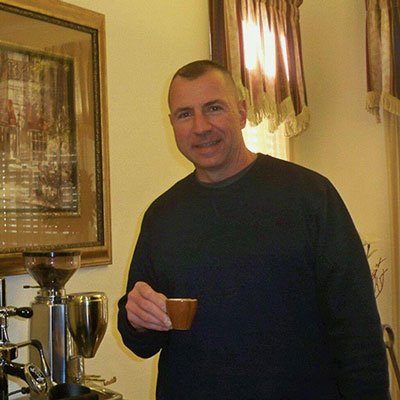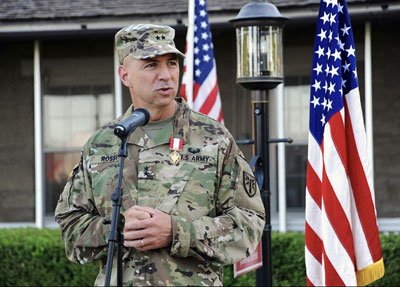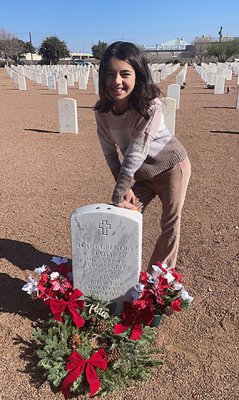The Cadence of the 21 Gunshots Pierced My Ears. I Braced Myself for Each One.
One by one, family and friends stepped up to the altar. They spoke of his bravery, leadership, and intelligence. They joked about his love for espresso.
Before it was my turn to speak, I rushed to the bathroom, palms sweaty and stomach turning. I spun the sink handle and watched the frigid water stream through my fingers. I counted backward from five, taking deep breaths. “Five … four … three … two … one.”
I slumped into the couch of the room set up for family. “Five … four … three … two … one.” My aunt walked in and placed her hand on my shoulder, comforting me with a few distracting chuckles before escorting me back to my pew.
The priest called my name, and I rose from the cold wooden bench. The blood rushed to my head. I stood up there with the words I yearned to say burning in my throat like a hot brand iron begging for the sweet relief of water. But I too went on about his bravery, leadership, and intelligence, and that he was the greatest father a girl could have. I, too, threw in a joke about his love for espresso. I said what I thought they all needed to hear. I said what I thought would make them all feel better.

Maria Rossi’s dad, Army Maj. Gen. John Rossi, enjoying espresso on Christmas Eve 2015. Photo courtesy of the author.
But all I wanted to say was: “Daddy, I’m sorry. You don’t have to worry. I love you.”
I fixated on the rows of poignant smiles staring up at me to avoid looking at his draped casket. As we followed it up the aisle and out of the church, I heard that haunting voice in my head.
You missed your chance. Again.
We climbed into a black limousine that crept behind a processional of marching soldiers, and after pulling up to a sea of people surrounding a stone pergola, I took my seat in the front row. I sat there, face to face with a pine box, while the priest prayed for his soul.
Ow! The cadence of the 21 gunshots pierced my ears. I gripped the folded flag, bracing myself for each one. Then came the taps; my face was drenched with tears before the second note had barely leaked from the trumpet. The priest concluded the ceremony, and everyone stood in line to give us a final “I’m so sorry” and “We’re here for you.”
I tapped my foot as the crowd of strangers dwindled. I just wanted everyone to leave. Finally, the casualty officer told us it was time to go to the reception. A pit grew in my stomach.
Dammit, I just want a minute alone with him! I need to tell him! I thought. Instead, I forced a settling smile as we piled into another car and drove past the pristine formation of marbled soldiers. You missed your chance, again, I hissed at myself.

Maria Rossi and her father, John Rossi, on a hike. The two had a “stereotypical” father-daughter relationship; he was her hero, and she was his little girl. Photo courtesy of the author.
My dad and I had an ideal, almost stereotypical, father-daughter relationship. He was my hero, and I was Daddy’s little girl. He was stern but soft. He would twirl me around the living room while the Carpenter’s vinyl played “Top of the World.” Yet I would hide in my room when I got an F in math, dreading the moment he walked in the door. This summed up our relationship.
I didn’t fear him. I feared disappointing him. And that fear has never gone away.
When I was 19 years old, I told my mother I was pregnant. She told my dad for me, and I hid. When I was 25 years old, I told my mother I was getting a divorce. She told my dad for me. I was that little girl again, hiding in my room, dreading his arrival.
Award-Winning Journalism in Your Inbox
I could hear the concern in his voice after my mother broke the news to him. By the end of it, I realized he wasn’t mad at me. He was just worried about me. And why wouldn’t he be? I had no degree, no job, no money. And a 5-year-old depended on me. Of course he worried.
But my need to show him and the world that I was fine, that there was no need to worry, consumed me. So I moved in with a man I barely knew, in a city I’d never visited, with no degree, no job, no money, and a 5-year-old who depended on me.
Of course he worried.
I knew my stupid decisions were stupid decisions. And I knew just how much I disappointed him. So, I hid.
We didn’t speak for weeks. Finally, he emailed me. I clicked it open, expecting a lecture or missive about his disappointment in me, but it was just a list of questions—everything he was worried about. My charade hadn’t fooled him. He knew I wasn’t fine. I didn’t respond. Not right away at least. I needed time to come up with the bullshit answers I thought would render him some comfort. A week later, I wrote him back.
He didn’t respond.
He’d been promoted to the rank of lieutenant general and was set to become commanding general of the U.S. Army Space and Missile Defense Command in Redstone, Alabama. I didn’t fully understand what any of that meant, but I knew it was a big deal.

Army Maj. Gen. John Rossi died by suicide days before he was set to pin on his third star and take the helm of the U.S. Army Space and Missile Defense Command in Redstone, Alabama. Photo courtesy of the author.
I wanted to tell him how proud I was. I wanted to go to his promotion. I wanted to tell him he was right. But I hid behind a mailed bouquet of chocolate-covered fruit with a cardstock note that read: “Daddy … 25th move, That’s impressive! I’m so proud to be your daughter. Good luck with the move and in Alabama … I hope you like the fruit. Love you all xoxoxo.”
He responded: “Maria, thank you for the nice fruit tree. You didn’t have to do that, save your money for Kylie and you. I hope you are doing OK. We will leave Oklahoma today and head to Alabama to start the next journey. Hopefully, it all works out, seems to be getting harder and harder as I get older. Know that I love you very much and will always worry about you. Love, Daddy.”
I had disappointed him again. Despite his genuine concern and kind words, I was kind of mad at him for not appreciating my gift. I had tried to extend an olive branch, and he told me I shouldn’t have. And not in a gracious way, like when someone gives you a hideous gift and you try to hide your disappointment. He really didn’t want me to send a gift.
Fine then, I thought, never imagining that card stock and email would be the last words we ever shared.
Nine days later, on a boring Saturday night, my phone buzzed—a text from my mom asking me to reach out to my dad because he didn’t seem OK.
“It’s a two-way street,” I replied stubbornly. “He can call me, too.”
By the next morning, a Sunday, I felt different. I drove home from church, thinking about the preacher’s sermon on forgiveness and mending relationships—the message had brought me to tears. The Texas sun beat down through the car windows, and I embraced the warmth. Little Kylie sang along in the back seat to the radio. I cracked the window to inhale the fresh breeze. Even the air smelled of hope and promise.
Everything’s going to be different, I thought. I just know it. It’s all going to be OK.
As if right on cue, my phone buzzed in my hand. “Mommy” flashed across the screen.
This is it. The new day begins now.
I lifted the phone to my ear. “Hi, Mommy!” I answered optimistically.
“Maria! It’s Daddy! Daddy!”
My father, Maj. Gen. John Rossi, had died by suicide.

Maria Rossi’s daughter, Kylie, at the gravesite of Maj. Gen. John Rossi, who died in 2016. Photo courtesy of the author.
The sun vanished. My body froze; goosebumps crawled across my skin. The thumping of my heart in my ears drowned out my mother’s desperate cries. Then it all went black. I saw nothing, I felt nothing, I heard nothing. I ceased to exist. Until I heard this voice that shocked me back to reality. The surge burned through every nerve in my body.
The next voice I heard was my own.
You missed your chance.
*****
Seven years later.
It’s another boring Saturday night. My phone buzzes—my daughter, Kylie, calling me on my drive home from work. We talk about our day, what we’ve been up to. Then she pauses.
“Mommy, why does Grandma make me feel bad for not calling her all the time?”
I chuckle; I’m familiar with the grief my mom can give about not calling often enough. “She just misses you, and she loves to hear from you,” I tell my daughter.

Seven years after losing her father to suicide, Maria Rossi found a way to tell him what she wanted him to know—through writing. Photo by Babee Garcia.
“It’s a two-way street,” she says stubbornly, and the words stop me. They echo—words lost in a cave for seven years returning to me at last.
My heart sinks.
Fighting back tears and the lump in my throat, I sigh. “Kylie, I need to tell you something.”
For the first time, I talk about the words I never got to say. After we hang up, I can still hear those words, and I cry the rest of the way home.
I’m worried. Like any parent. I worry that she will know the suffering of regret. I worry that the hellish voice will find her. I worry she will know the agony of missing her chance.
I won’t let that happen, I decide. I’ll save her from my pain. But how?
Nine days later.
I have convinced myself to apply for—and accept—a spot in The War Horse’s Writing Seminar for Post-9/11 Gold Star Children and Siblings in Justin, Texas. When I arrive, I am welcomed by the War Horse team and introduced to the other fellows. I force a confident smile to try and hide my insecurities.
Our Journalism Depends on Your Support
What the hell am I doing here? I silently ask myself. I don’t deserve this chance.
As each day passes, this group of strangers becomes a group of friends. We expose our vulnerabilities and share our deepest secrets. For once, my pain is understood—we are bonded together in our tragedies, and in that, I find comfort.

During the 2023 Writing Seminar for Gold Star Children and Siblings at the Lucky Spur Ranch in Justin, Texas, Maria Rossi writes about losing her father. Photo by Babee Garcia.
Halfway through the week-long seminar, on a perfect spring day, I sit in an old wooden rocking chair and take in the warmth of the Texas sun beating down. I stare at the blank page in front of me.
What do I say? I know what I want to say, but can I say it?
I take a deep breath, and the smell of hope and promise fills the air once again.
Then, I hear the same voice that has haunted me for seven years. Only this time, it is tender and kind. It proclaims gently: This is your chance.
I begin to type.
“Daddy, I’m sorry. You don’t have to worry. I love you.”
This War Horse reflection was written by Maria Rossi, edited by Kristin Davis, fact-checked by Jess Rohan, and copy-edited by Mitchell Hansen-Dewar. Headlines are by Abbie Bennett.





Comments are closed.